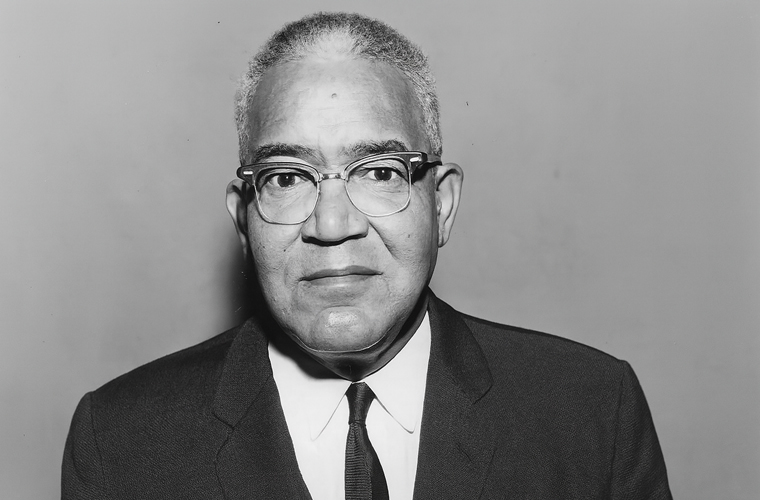Horace Mann Bond (November 8, 1904 – December 21, 1972) was a transformative figure in American education, particularly known for his role as the first African American president of Lincoln University in Pennsylvania, serving from 1945 to 1957. A historian, educator, and social science researcher, Bond’s presidency marked a significant milestone for the nation’s oldest degree-granting Historically Black College and University (HBCU), founded in 1854. His leadership, scholarly contributions, and commitment to civil rights left an enduring legacy in American higher education and the broader struggle for equality.
Born in Nashville, Tennessee, to college-educated parents, Jane Alice Browne, a schoolteacher, and James Bond, a Congregationalist minister, Horace Mann Bond grew up in an environment that valued education and intellectual achievement. Both of his parents were graduates of Oberlin College, and they instilled in Bond a deep appreciation for learning. The grandson of enslaved Africans, Bond faced racial challenges early in life, including incidents of violence and discrimination, which shaped his commitment to social justice.
A precocious student, Bond entered high school at age nine and enrolled at Lincoln University at fourteen, graduating with honors in 1923 at the age of nineteen. He later pursued graduate studies at the University of Chicago, earning a master’s degree in 1926 and a Ph.D. in the history of education in 1936. His doctoral dissertation, Negro Education in Alabama: A Study in Cotton and Steel, won the Rosenberger Prize and was published in 1939, establishing him as a leading scholar on Black education in the South.
Before his presidency at Lincoln, Bond held various academic and administrative roles at several HBCUs, including Langston University, Fisk University, and Dillard University, where he served as dean from 1934 to 1937. In 1939, he became the first president of Fort Valley State College (now Fort Valley State University) in Georgia. During his tenure, he transformed the institution from a junior college into a four-year, baccalaureate-granting institution, doubling its income and tripling state appropriations despite the economic challenges of the era. His success at Fort Valley demonstrated his administrative prowess and commitment to improving educational opportunities for African Americans.
Bond’s scholarly work during this period was equally impactful. He published numerous articles and books, including The Education of the Negro in the American Social Order (1934), which critiqued the systemic barriers to Black education. His research challenged racist assumptions about intelligence, particularly in response to biased IQ testing, and laid the groundwork for his later contributions to the civil rights movement. In 1945, Bond was appointed president of Lincoln University, becoming the first African American and the first alumnus to lead the institution. His selection was a historic moment for Lincoln, which had been led by white presidents for its first nine decades despite its mission to educate “youth of African descent.” Bond’s deep connection to the university, coupled with his proven leadership at Fort Valley, made him an ideal candidate.
During his twelve-year tenure, Bond worked to strengthen Lincoln’s academic programs and faculty diversity. He increased the number of Black faculty members and hired the university’s first Jewish professor, broadening the institution’s inclusivity. Notably, in 1946, Bond oversaw the granting of an honorary Doctor of Laws degree to Albert Einstein, recognizing the renowned physicist’s contributions to science and his advocacy for civil rights. This event highlighted Lincoln’s growing prominence and Bond’s commitment to connecting the university with global intellectual and social justice movements. Bond’s presidency coincided with a critical period in the civil rights movement, and his research played a pivotal role in the landmark Brown v. Board of Education (1954) Supreme Court case, which declared school segregation unconstitutional. His historical analyses of Black education provided evidence for the NAACP’s legal arguments, cementing his influence on the fight against segregation.
Bond also fostered significant relationships during his presidency, notably with Albert C. Barnes, the founder of the Barnes Foundation. This connection resulted in Lincoln University gaining control of the foundation’s board of trustees, overseeing a world-class art collection valued at billions in later years. However, Bond’s tenure was not without challenges. His formal demeanor and activism occasionally led to tensions with faculty, alumni, and the board of trustees. These conflicts, combined with his desire to provide better educational opportunities for his children, led to his resignation in 1957.
After leaving Lincoln, Bond returned to the South, serving as dean of the School of Education and later director of the Bureau of Educational and Social Research at Atlanta University (now Clark Atlanta University) until his retirement in 1971. He continued his research, focusing on the social factors influencing academic achievement and critiquing standardized testing’s biases against African Americans. Bond’s scholarly output was prolific, with 86 articles, six books, and numerous speeches addressing education, race, and social justice. His work, including Education for Freedom: A History of Lincoln University (1976), remains a cornerstone of African American educational history. His papers, archived at the University of Massachusetts at Amherst, offer a rich resource for understanding his contributions to education and civil rights.
Bond was also the father of Julian Bond, a prominent civil rights leader, co-founder of the Southern Poverty Law Center, and former NAACP chairman. Horace Mann Bond’s support for his son’s activism further amplified his family’s impact on the civil rights movement. Bond died on December 21, 1972, in Atlanta, Georgia, at the age of 68. His legacy endures through the Horace Mann Bond Honors Program at Lincoln University and the Horace Mann Bond-Leslie Pinckney Hill Scholarship Program, which supports Pennsylvania students pursuing graduate studies.
Horace Mann Bond’s presidency at Lincoln University was a defining chapter in his remarkable career. As a scholar, administrator, and advocate, he advanced the cause of African American education and civil rights, leaving an indelible mark on Lincoln University and the nation. His role in granting an honorary degree to Albert Einstein, his contributions to the Brown v. Board case, and his transformative leadership at Lincoln underscore his significance as a pivotal figure in 20th-century American history.

